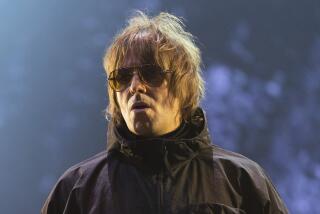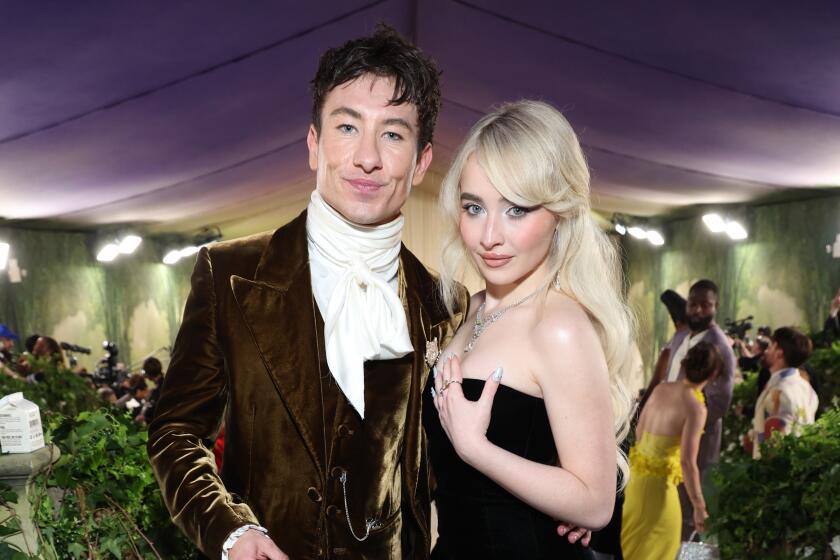What’s the Ticket to Halt the Brokers?
- Share via
Why not a mail-order lottery?
It’s obvious by now that there’s no way Bruce Springsteen, his management company, his booking agency or his local concert promoter can keep tickets--lots of tickets--out of the hands of brokers as long as the tickets are sold over the counter.
No sooner had Ticketmaster’s computerized machines cooled off last Saturday at Music Plus stores throughout Southern California than brokers were boasting they had as many tickets as they could sell for Springsteen’s five-night Los Angeles Sports Arena engagement, which begins Friday.
Resale prices for the $25.50 ducats: $50 for the worst seats in the 15,000-capacity Sports Arena and around $600 for the best.
All this despite an elaborate system designed by Avalon Attractions, which is producing the concerts here, to make it as difficult as possible for brokers to acquire tickets to the shows.
The system involved surprise announcements on eight Southern California radio stations 30 minutes before priority wristbands were handed out at 4 p.m. on April 8 at the Music Plus stores.
Everyone who obtained a wristband was eligible to return to the store the following morning and buy up to four tickets. The tickets were sold according to priority numbers on the wristbands--numbers that were selected that morning.
Grumbling about the system began almost as soon as the Ticketmaster machines started humming.
The complaints fell into two areas: inadequate notice of the ticket sale and numerous sightings of “teams” of buyers at some locations who were believed to be working for brokers.
On the question of notice, Doug Richardson, 29, Sherman Oaks, called The Times this week to say, “I understand Springsteen’s contempt for these ticket agencies, but the use of spot announcements (is) leaving a large portion of his fans in the cold.
“If you were either working or not tuned into the radio, you weren’t able to get tickets . . . What this did was force a lot of his fans--especially the die-hards--to go to brokers and pay whatever they’re asking.”
Another reader was upset about what he said he witnessed at one Music Plus store.
James Geffner, Los Angles, expressed dismay over seeing “large groups of young men, all wearing wrist bands . . . congregated around a single individual whom I recognized from prior attempts at buying tickets as being a representative of one of the ticket brokers. . . . How was it possible that the brokers could organize themselves . . . when they only learned about the numbers being handed out at 3:30? The answer is obvious. . . . Someone tipped them off. . . . This is a disgrace and an offense to the concertgoers of California.”
The question that many were asking: Why not a mail - order lottery?
The question isn’t academic because there is a mail-order lottery for Springsteen tickets . . . just 400 miles away.
Bill Graham, the San Francisco-based concert producer who is handling the Springsteen dates May 2 and 3 at the Shoreline Amphitheatre in Mountain View, is selling tickets by mail order.
According to newspaper ads last weekend, all orders had to be postmarked by Friday--a limit of two tickets per envelope. The ad indicated that orders would be filled randomly with the best available seats from either show.
Graham, in a phone interview this week, said his company utilized a similar mail-order system for a 1986 benefit concert at Shoreline featuring Springsteen and Neil Young. He termed the response “overwhelmingly positive” even though 80,000 to 100,000 orders were received for the available 17,000 seats. He expects approximately 400,000 orders this time for the 34,000 tickets.
“If the ticket requests for any artist by far exceeds the supply, the best thing you can do (as a promoter) is make sure all the ‘losers’ pay the same, simple price,” he said. “In this case, they start out with equal notice about the system--then they have to get a money order, stick it in an envelope and put it in the mail.
“They don’t have to get a baby sitter or leave work early to stand in line. They also don’t have to listen to the radio all week for an announcement. The only difference in the end is that one envelope is plucked out and the other one isn’t.
“And there’s one more thing: Mail order eliminates scalping to a great extent.
Avalon’s Brian Murphy said mail order was ruled out here for two reasons: the relative short amount of time to handle a massive volume of mail--it’s conceivable, he said, that there would be enough orders for a million tickets--and the controversy that accompanied a mail-order system for Springsteen shows here in 1980.
“I think there was still a foul taste in the mouth of Bruce’s management about the way mail order was done in Los Angeles for his shows at the Sports Arena in 1980,” said Murphy, whose firm was not involved in those shows.
The 1980 experiment apparently did little to prevent tickets from getting into the hands of brokers.
“I was just watching that one on the sidelines,” Murphy said this week. “But I remember reading article after article and listening to radio station after radio station about all the dissatisfaction.”
In 1980, dozens of fans wrote to The Times, questioning whether the mail-order tickets were processed fairly. They contended that their tickets were in remote sections of the arena, while agencies had choice floor or loge seats which they were reselling for upward of $250.
There were numerous outcries for legislation to set a ceiling on what brokers can charge for tickets (there is currently no ceiling), but none was ever set.
However, Murphy, who worked out the surprise announcement system in consultation with Springsteen’s management team, said he will be watching the Shoreline experience to see how that mail-order system works.
Will there simply be another round of charges from those who don’t get tickets that the envelopes weren’t drawn fairly?
Graham said he and his staff will personally oversee the handling of envelopes rather than have them processed by an outside agency.
Murphy said last weekend’s surprise announcement plan was aimed at reducing both the impact of brokers and preventing massive lines at outlets.
“I think it would have been irresponsible on our part to put an ad in the newspaper, saying tickets are going on sale at 10 a.m. Saturday and it’s first come, first served,” he suggested.
“There could have been real physical problems. You’d have 600 people standing in line for hours at each outlet, waiting for the store to open, and then all of a sudden they realize two hours have gone by and the line’s not moving. Things could easily get out of hand.”
He said delaying ticket sales until two weeks before the concert was an attempt to thwart brokers by giving little resell time.
Brian Harlig, co-owner of Good Time Tickets in Hollywood, acknowledged this week that his firm bought only one-third of the tickets it could have because of the limited time before the concerts.
But it seems the demand for tickets may even be greater than anticipated.
“We’ve never seen anything like this one,” he said. “When Bruce comes to town, it dwarfs everything else. Nothing approaches the hysteria.”
Those in the concert industry surveyed about the Springsteen ticket issue agreed there is no way to keep choice tickets out of brokers’ hands once the tickets go on sale over the counter--given the fact that brokers operate legally and there are enormous financial incentives involved.
“Here’s the point,” said one source. “There’s no way a fan is going to be able to compete with what is a year-round business. The brokers make it their business to know about when tickets go on sale long before the public so they can get their people to the ticket outlet. My guess is they usually have at least a week’s advantage. There must be 500 people in the business--people at the ticket outlets, the record company, the management company and so forth--who know when tickets will go on sale, so all the brokers have to do is tap into one of those people. Then, they line up a crew.”
On the subject of brokers, Graham said, “It’s not just that they have commandos who get in line, they’ll go to the line and buy them from the (regular fans). A fan might at first say, ‘No, I wouldn’t give up my ticket for anything.
“But then, the broker says, ‘Here’s $200.’ “
“The fan says back, ‘No way! “”
“ ‘Here’s $300.’ “
“ ‘No way!’ ”
“‘Here’s $500.”’
“ ‘Five hundred dollars?’ ”
“Sooner or later, the broker’s got a sale.”
LIVE ACTION: Robert Plant will be at the Pacific Amphitheatre on June 13 and the Forum on June 14. Tickets for both shows go on sale Monday. . . . Tickets go on sale Sunday for Bob Dylan’s concert with the Alarm at the Pacific Amphitheatre on July 31. . . . Tickets for 13 other upcoming shows at the Pacific Amphitheatre also go on sale Sunday and Monday, including Tiffany (July 2), Hank Williams Jr. (Aug. 12), Gloria Estefan and Miami Sound Machine (Aug. 27) and Randy Travis with the Judds (Sept. 25). . . . Tickets on sale Sunday for So at the Roxy on May 9 and the Smithereens at the Roxy on May 18-19. . . . On sale April 23 is Iron Maiden with Guns N’ Roses at Irvine Meadows on June 8-9. . . . The Swans show scheduled for April 23 at the Variety Arts Center has been moved to Friday at the John Anson Ford Theatre, where the band replaces a cancelled appearance by Pop Will Eat Itself on a bill with Gaye Bykers on Acid.
TICKET BROKERS’ TOP ROCK CONCERT PRICES
Bruce Springsteen at Sports Arena, April 22-28, 1988. . . . . . .$600 Neil Diamond at Greek Theater, August, 1986. . . . . . . . . . . $400 Springsteen at Coliseum, August, 1985. . . . . . . . . . . . . . $350 Springsteen at Sports Arena, October, 1984. . . . . . . . . . . .$250 U2 at Sports Arena, April, 1987. . . . . . . . . . . . . . . . . $250 Jacksons at Dodger Stadium, December, 1984 $250 Madonna at Anaheim Stadium, July, 1987. . . . . . . . . . . . . .$250
Lowest face value for a single concert ticket was $15, with prices ranging up to $30 for top seats for Neil Diamond and Michael Jackson.
(Top broker prices charged for 1988 Super Bowl. . . . . . .$2,000.) Source: Good Time Tickets
Steve Hochman contributed to this story.
More to Read
The biggest entertainment stories
Get our big stories about Hollywood, film, television, music, arts, culture and more right in your inbox as soon as they publish.
You may occasionally receive promotional content from the Los Angeles Times.










